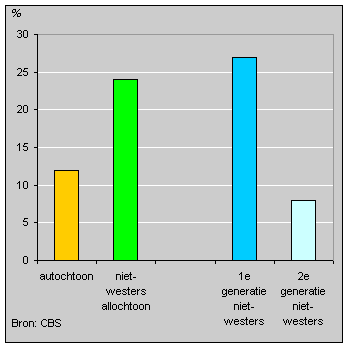One quarter of people of non-western descent claim social benefit

At the end of 2000, nearly one quarter of people in the Netherlands with a non-western foreign background in the age group 15-64 years received a social benefit.. This is twice as many as native Dutch people, of whom 12 percent had a benefit. More people with a non-western background were likely to claim the income support benefit in particular.
Turks and Moroccans most likely to receive benefit
The people most likely to receive a benefit were those with a Turkish or Moroccan background: 29 percent of Turks were claiming a benefit at the end of 2000; for Moroccans this was 28 percent. But among people with an Antillean, Aruban or Surinamese background, too, the proportions receiving a benefit were much higher than among native Dutch people: 23 percent of Antilleans and Arubans and 21 percent of people with a Surinamese background.
Benefit claimants by country of descent, 31 Dec. 2000

Income support most often claimed
People with a non-western foreign background more often claim income support in particular. At the end of 2000 14 percent of this group received income support, compared with only 2 percent of the native Dutch population. The differences are largest for older people. Three percent of 55-64 year-old native Dutch people received income support, compared with 30 percent of non-western people in this age group.
Claimants by type of benefit and background, 31 Dec. 2000

Six in ten older Turkish men incapacitated
Relatively speaking, slightly more native born Dutch people have a disability benefit. Nine percent of native Dutch had a disability benefit, compared with eight percent of foreigners with a non-western background.
Older people are more likely to receive a disability benefit. With 61 and 46 percent respectively, considerably more older Turkish and Moroccan men than average claim a disability benefit. For native men in the same age group the percentage of claimants was 27.
Fewer second generation claimants
Second generation foreigners with a non-western background are considerably less likely to claim a benefit than those actually born abroad. Eight percent of the second generation had a benefit at the end of 2000, compared with 27 percent of the first generation. This difference can mostly be attributed to the younger average age of this group: 93 percent of second generation foreigners with a non-western background are between ages 15 and 34. In the first generation only half are in this age group.
Benefit claimants by foreign background and generation, 31 Dec. 2000

Annelies Boerdam